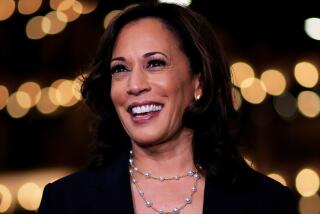POLITICAL BRIEFING
- Share via
AFTER THE COUP: The collapse of last week’s coup against Soviet President Mikhail S. Gorbachev is expected to make life even more difficult for Democrats in the 1992 U.S. presidential campaign.
Not only have the events strengthened President Bush’s image as a world leader, but they also have dampened hopes by Democrats that they might be able to skirt key foreign policy issues in the campaign and concentrate on America’s domestic problems instead.
Before the coup began, some of the leading prospective Democratic presidential candidates--New York Gov. Mario M. Cuomo, Iowa Sen. Tom Harkin, Virginia Gov. L. Douglas Wilder and former Massachusetts Sen. Paul E. Tsongas--had spent most of their time talking about domestic issues, virtually ignoring foreign policy except to defend their earlier opposition to the Persian Gulf War. Party professionals contend that the election will be won on domestic issues, and few believe that any of the Democratic hopefuls has the stature to challenge Bush on foreign affairs.
But party insiders concede that with Bush’s own prestige enhanced even further in the wake of the failed coup, the Democrats may now be compelled to spell out their own visions on such issues as U.S.-Soviet relations in greater detail. “This is a reminder that Democrats cannot be elected to the White House unless they have a coherent foreign policy vision,” one party strategist said.
UNFOND FAREWELL: The timing of the announcement by Sen. John D. (Jay) Rockefeller IV that he would not enter the 1992 Democratic presidential competition irked party leaders so much, they let Rockefeller know about it.
The West Virginia senator’s Aug. 7 withdrawal statement came just as Democrats believed they were finally making some headway with their complaint that President Bush is not paying enough attention to domestic affairs. They even had succeeded in forcing Bush to defend himself.
But party leaders complain that by saying farewell to his much-ballyhooed candidacy when he did, Rockefeller relieved the pressure on Bush and instead focused attention on the Democrats’ own difficulties in recruiting candidates. Some had hoped that Rockefeller would wait for some positive Democratic news--such as the Aug. 15 announcement by Arkansas Gov. Bill Clinton that he is closer to entering the race--that might have blunted the impact of his own withdrawal.
DRAFT CHOICE? If the Democrats can’t find enough politicians to seek the party’s presidential nomination, then how about a nonpolitician--like Ralph Nader? Two former associates of Nader have launched a drive to draft the consumer advocate for the job. Early next month, Matthew Rothschild, publisher of The Progressive magazine, and Carl J. Mayer, a law professor at Hofstra University, will convene a meeting in Washington with supporters to begin fund raising and petition drives in 25 states aimed at attracting Nader to the race.
They also will unveil a nationwide poll that reportedly shows Nader stacking up strongly against other potential presidential contenders. Nader has indicated no interest in seeking the nomination, but--unlike 1976, when he rejected a similar movement--he has not discouraged the current draft effort in the belief that it could raise important issues in the Democratic debate. But Nader has his own preferred candidate: He’s trying to persuade populist former Texas Agriculture Commissioner Jim Hightower, who was defeated last fall, to enter the race.
More to Read
Get the L.A. Times Politics newsletter
Deeply reported insights into legislation, politics and policy from Sacramento, Washington and beyond. In your inbox twice per week.
You may occasionally receive promotional content from the Los Angeles Times.










